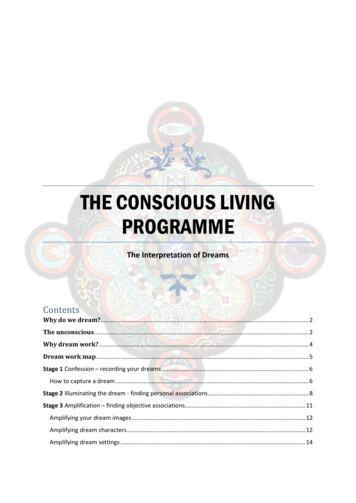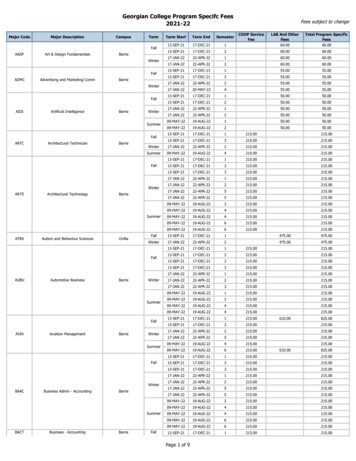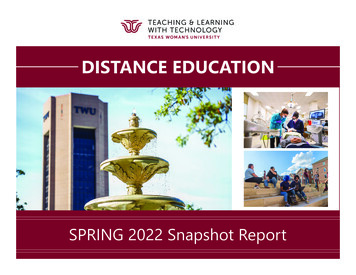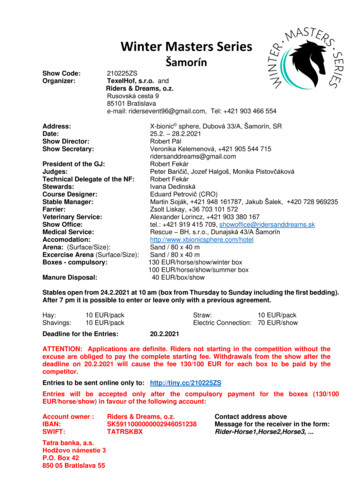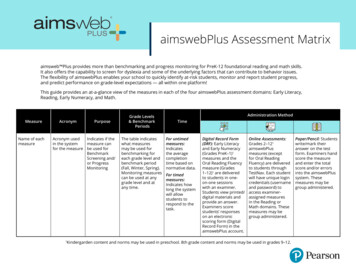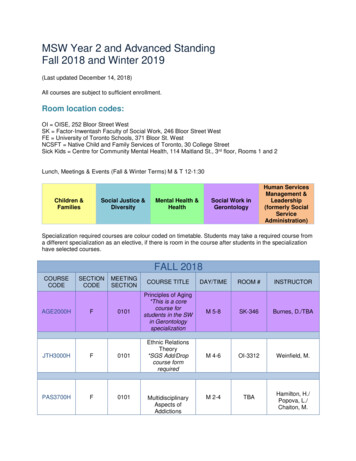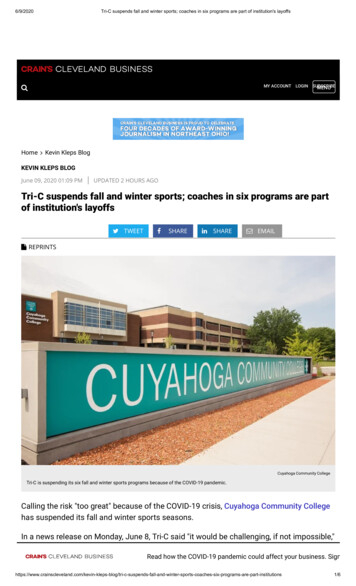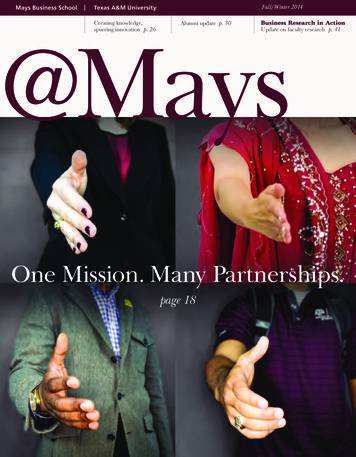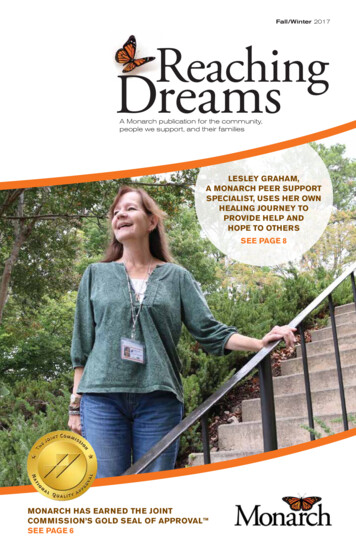
Transcription
Fall/Winter 2017ReachingDreamsA Monarch publication for the community,people we support, and their familiesLesley Graham,a Monarch Peer SupportSpecialist, uses her ownhealing journey toprovide help andhope to othersSee Page 8Monarch Has Earned The JointCommission’s Gold Seal of Approval See Page 6
Straight from PeggyAs I write this, I can barelycontain my excitement. Iam thrilled to share that thelong-anticipated accreditationconducted by The JointCommission (TJC) process hasoccurred – and I have greatnews. On Oct. 24, 2017, wereceived the official confirmationthat Monarch earned The JointCommission’s Gold Seal of Approval .I must thank our amazing Joint Commission Prep Team,see them on Page 7, who mobilized us and kept us ontrack. The people we support also played a role! OnPage 7, you’ll meet Dina Castillo, a person who livesin our residential program, who helped to support theaccreditation process. Dina and the nearly 30,000people we support statewide encourage us every day todo and be our best. This accreditation and the processmakes Monarch a stronger, more improved company.I’m so grateful and I can’t thank you enough. Workingtogether, we did it!Monarch voluntarily experienced TJC’s thoroughassessment this summer. Over nine days, five surveyorsvisited more than 100 Monarch sites. Each wasrigorously evaluated for compliance with healthcarestandards related to care, treatment and services;environment of care; leadership; and screeningprocedures for the early detection of imminent harm.Rigorous onsite observations and interviews wereconducted statewide in our behavioral health facilitiesand long-term services and support programs. Readmore about our accreditation journey on Page 6.I am extremely pleased to announce that Monarch isamong the more than 21,000 organizations worldwideThe Joint Commission accredits and continuallyevaluates for quality health care.There is more exciting news to share. On Page 2, you’lllearn about the expansion of our 24-hour, inpatientFacility-Based Crisis (FBC) center in Lumberton. Withsupport from Eastpointe LME/MCO, federal and statefunding and The Cannon Foundation, Inc., we increasedoccupancy to 16 beds, the maximum number allowed bythe state. We can help more people.I am so proud of our entire workforce who supported theprocess and helped to make this accreditation a reality.Our staff stood ready to respond and their commitmentwas evident to the surveyors. It spoke volumes.Commitment came from staff members like LesleyGraham, a peer support specialist in one of our WakeCounty behavioral health offices, who uses her recoveryexperience and passion to help people find hope andtheir own recovery. See Lesley’s story on Page 8.And before this year ends, we will open ourMecklenburg FBC for Children and Adolescents inCharlotte, which will be the first of its kind in the state.We have shared details about this important facility allalong and will soon share how it addresses a key needfor children and adolescents ages 6-17 who face amental health crisis.Since 1958, Monarch has identified effective andinnovative ways to support people with disabilities. I amproud of our legacy. Next year, we will commemoratea 60-year milestone and our anniversary theme,“Honoring Our Past, Celebrating Our Future” will reflectMonarch’s past, present and future. Be on the lookoutfor lots of exciting events. Monarch’s future is bright andthere is lots to celebrate!Peggy S. Terhune, Ph.D.Monarch President/CEOReaching Dreams is the official Monarch publication forOur Visionthe community, people we support, and their families.We will lead the way in the state to creatively support peoplewith disabilities in growing toward their potential, reachingOur Missiontheir dreams, and making their own informed choices aboutWe are committed to supporting, educating, andwhere they live, learn, work, play, and worship. Throughempowering people with developmental and intellectualpartnerships and relationships with our community, we willdisabilities, mental illness, and substance use disorders tooffer a variety of innovative quality services and supportschoose and achieve what is important to them.and will promote advocacy, awareness, education, training,employment, and residential opportunities.
Craig Cavanaughuses his passion for music to documenthis journey and to help others“My OCD very much controlled my life in my 20s. I feel like I am doingbetter, I am very appreciative to my medicine,” he explained. “I feel a lotof relief. The OCD really stressed me out.”Cavanaugh found support at the Richmond Psychosocial Rehabilitation(PSR) program in Rockingham. It was a refuge for him. He got the helphe needed including the tools to cope with his disorder and admits thatone specific program, the Wellness Recovery Action Plan (WRAP), wasespecially helpful in his recovery journey.“We teach WRAP programs, which is a long lesson to learn to mentallytake care of oneself,” he explained. “To notice when you are gettingsick, when your symptoms are coming up and when to realize you needto go get some help.”Craig Cavanaugh inspires others with hisrecovery and his music.Craig Cavanaugh, a resident ofMonarch’s Cauthen Drive home inRockingham, has dedicated his life tohelping others through service and music.Both interests seem to help him cope withObsessive Compulsive Disorder (OCD).“My voice is sort of good. I don’t have thatJohn McCarthy voice,” Cavanaugh chucklesas he describes his sounds as fresh originalpop. “I’ve been writing songs for well over30 years and I feel like I am good at it.”Now in his 50s, Cavanaugh was in his 20swhen he was active in a band with a closefriend but eventually moved to RichmondCounty to focus on his health.Executive EDITORPeggy S. Terhune, Ph.D.President/CEO, MonarchMANAGING EDITORNatasha A. SuberVice President, Marketing &CommunicationsCavanaugh used all that he learned to improve his health. Now, heserves as a peer volunteer to help others at the Richmond PSR. Heassists with programming and whatever comes up throughout the day.He likes talking to people receiving support at the PSR and enjoysretelling his story hoping it helps others along their journey.“I felt like I had run my course as a client and I was getting better. Isaw myself improving and I thought maybe I could help other people’”shared Cavanaugh. “I could maybe inspire other people if they saw howI got better.”Cavanaugh also lends his time at the local Habitat for Humanity, wherehe pitches in with whatever needs to be done. And while he is happyvolunteering at the PSR and with Habitat for Humanity, he is constantlyworking towards his dream of performing as a musician and sharingthe songs he writes with a large audience.“You could say it’s my ultimate fantasy,” said Cavanaugh.Whether it is through his music or his volunteer work, Cavanaughconstantly impacts his community through the power of his storytelling.By Laura Guidry, Community Liaison at MonarchCONTRIBUTORSAdina BlakeLaura GuidryBlake MartinYesenia MuellerSarah PisciuneriNathalie Santa MariaLaurie WeaverCreative DirectorDonna Wojek GibbsMonarch Boardof Directors 2017Jeffrey B. Gaskin, Board ChairLee Allen, Vice ChairBrenda L. Hinson, ImmediatePast Board ChairJames “Jack” A. BauerKent Earnhardt, Ph.D., JDLarry J. Hinson, The Arc ofStanly ChairJeffrey L. IrvinJoan JohnsonBarbara M. Kean, Ed.D.Joel Laster, Jr.Benjamin MarshMichael J. McCrann, JDRachel L. MorrisonDuncan MunnRandall PhillipsSteve W. Surratt, Sr.
Pictured (from l-r): Peggy Terhune, President & CEO, Monarch; Jessica, Charles and Cynthia B.; Sarah Stroud, CEOEastpointe; Gary Williams, Project Manager, Turner Construction; and Walt Caison Ph.D., Section Chief, CommunityMental Health Section for Division of Mental Health, Developmental Disabilities and Substance Abuse Services for theState of North Carolina.Monarch’s Facility-Based Crisis center in Lumbertoncelebrates expansion, open houseRobeson County man says his family and Monarch’s crisis facility helped him find the road to recoveryOn Aug. 28, approximately 50 community members,elected officials, representatives from the hospital,social services, school system, and Eastpointe, theregion’s managed care organization (MCO), gatheredat Monarch’s Facility-Based Crisis (FBC) center, 207 W.29th St., Lumberton, for a grand reopening ceremony.The facility was recently renovated and expanded.The renovated crisis program provides in-patienttreatment options for people with mental illness andsubstance use disorders requiring 24-hour secure andmedically supervised care.Monarch received more than 2 million in support fromEastpointe and federal and state funding streams. TheCannon Foundation also contributed to the renovationand expansion of the FBC center. The facility providesthe first step in life-changing treatment for adults whoare experiencing a mental health crisis or need non-2Fall/Winter 2017 Reaching Dreamshospital substance use and detoxification services –adults like Charles B., a Robeson County resident, whohad become unrecognizable, even to himself.Charles found Monarch’s Facility-Based Crisis centerin Lumberton when his drinking became excessive,and he started to lose friends, jobs, and the ability tocope with daily life.“I have a very close family. I could see how I wastearing them apart. I was out of my character and I wascompletely under the influence of alcohol,” Charlesadmitted. “For years, I was hiding it, or so I thought. Ijust wanted that drink. I would wake up in the morningand wanted a drink, and I would drink.”This year, he celebrated three years of sobriety andsaid Monarch’s staff provided incredible support andguidance to help him find his road to recovery.
Putting the careinto Mental Health Care“Everybody (at Monarch) was excellent. Theytook my recovery to heart and I was confidentwhen I walked through those doors that I wouldbe able to make it,” said Charles, who alsoattends Alcoholics Anonymous (AA) meetingsseveral times weekly at a local church, mentorsothers who are struggling with substance use,and works a fulltime job he loves. “Now, I take itone day at a time. I wake up each day with thegrace of God and I’m clean and sober.”The extensive renovation and expansion ofthe FBC grew the facility from 11 beds to 16,increasing Monarch’s ability to provide servicesto people in Lumberton and neighboringcommunities who are struggling with a mentalhealth or substance use crisis. The capitalproject is a partnership between Monarchand Eastpointe. The facility is designed asan appropriate, time-limited alternative toemergency room visits and hospitalization.“We are grateful to Eastpointe, The CannonFoundation and others for their support ofthis project. The renovation and expansion ofthis facility will enhance the region’s mentalhealth care continuum and allow us to providecritical services as we help people find theirroad to recovery,” Monarch President and CEODr. Peggy Terhune told the audience. “We areexcited about the impact this additional spacewill have on our ability to meet the needs of thiscommunity and we are thankful for the supportwe have received.”Monarch also provides outpatient services at2003 Godwin Ave. in Lumberton and has officesin Laurinburg and Whiteville. The organizationprovides other services throughout the regionincluding therapy, mobile crisis, supportedemployment and day programs for peoplewith intellectual and developmental disabilities.For more information about services providedin the region, visit www.MonarchNC.org or call(866) 272-7826.Monarch assumes managementof services in Cabarrus, Gastonand Rowan counties formerlyoperated by Community LivingConcepts, Inc.Monarch announced an expansion of long-termservices in Cabarrus, Rowan and Gaston counties.On Sept. 1, the Albemarle-based organization began managingservices formerly provided by the Community Living Conceptsof North Carolina.The supervised living and community network servicesacquired in this transition include homes occupied by19 residents with intellectual and developmental disabilities(I/DD). The group homes will keep the existing names andsimply add Monarch to the moniker. Monarch staff has workedto ensure that people who receive services do not experience adisruption of those services.In Cabarrus, Rowan, and Gaston counties, Monarch addsthese homes to an array of existing services that includesSupported Employment, Peer Support, Intensive In-Home andAssertive Community Treatment Team (ACTT) services andan outpatient office in Gastonia.We’re Social!Do you like to be informedabout legislative affairs thatimpact the industry and thepeople we support? Would you like to know about events, companyannouncements and activities hosted by Monarch? To stay current onthe latest events and updates, to view fun or compelling videos, hearfrom Monarch experts or see photos of activities conducted by thepeople we support, volunteers and staff, “Like” or follow one or all ofMonarch’s social media sites. You’ll be glad that you did.Reaching Dreams Fall/Winter 20173
The University of North Carolina at Greensboroselects Monarch as partner for Beyond AcademicsThe University of North Carolina atGreensboro (UNCG) selected Monarch asits community partner of choice to providesupport services to students enrolled inthe Beyond Academics ComprehensiveTransition Program. The new partnershipbegan July 1, 2017. The IntegrativeCommunity Studies (ICS) program was thefirst post-secondary program for studentswith intellectual and developmentaldisabilities (I/DD) in North Carolina.Created by UNCG Vice Chancellorfor Research and EngagementDr. Terri L. Shelton in 2007, BeyondAcademics provides a post-secondaryeducation option to students with intellectualand developmental disabilities. Studentsenrolled in the Beyond Academics programat UNCG receive a four-year certificate ofcompletion in Integrative Community Studies(ICS) from the Office of the Provost. Duringtheir certificate work, students engagein civic and social activities which createa comprehensive skill set, preparing thestudents to become active contributors tothe communities in which they live.4Fall/Winter 2017 Reaching Dreams“As we enter the next decade of accessible excellence in providingpost-secondary education for individuals with I/DD, UNCG ispleased to begin this partnership with Monarch,” said Shelton atUNCG. “The provision of support services for Beyond Academicsis an essential part of the academic programming that provides aunique opportunity for students to apply the skills acquired in thecertificate program. We can think of no better partner in moving thisimportant initiative forward.”The partnership will allow Monarch’s existing expertise in supportservices to help students in the ICS program to advance their skills tolive independently.“As a long-time, statewide provider of services for people withdisabilities, our staff is both qualified and dedicated to the continuationof this dynamic program,” said Monarch President and CEO Dr. PeggyTerhune, who is a UNCG graduate. “We will continue to assist studentswith the pursuit of their academic achievements while we also help themto proactively explore their interests outside of the classroom. As wecontinue support for Beyond Academics in this more expansive role, weremain committed to the successful future of this important program.”Dr. Karen Diegelmann was hired to serve as the Beyond AcademicsPostsecondary Education Support Team Leader at Monarch. She hasextensive experience managing and providing support services forstudents with intellectual and developmental disabilities.There are 62 students currentlyenrolled in the program.
Check out our websitewww.MonarchNC.orgYou spoke. We listened.More Reaching Dreams delivered to youIf you have enjoyed receivingReaching Dreams twice annually, thenwe’ve got a treat for you. We launcheda digital version of our ever-popularpublication this summer, and we areexcited about this online edition. Don’tfret, we will still produce two printedcopies each year, but we plan to providemore great stories, four more times eachyear in the new digital format.Following our newsletter survey, you shared your feedback aboutwhat you wanted to read and how often you wanted to receivegreat stories and news updates from Monarch. You spoke. Welistened. Thanks to all who responded.If you would like to receive Reaching Dreams and ReachingDreams Online, and aren’t currently a subscriber, please visitwww.MonarchNC.org, click on the ‘Keep in Touch’ link at thebottom or top of the Monarch homepage and share yourpreferred contact information. We will add you to our mailing list.It’s that simple. Happy reading!SAVE THE DATE: Monarch’s Annual GolfTournament in Mt. Gilead planned for April 20, 2018Popular fundraiser celebrates 10 yearsThis year’s milestone event will be hosted byTom Stewart and his niece, Katie Smitham,who will serve as honorary tournamentco-chairs. Stewart is a Lifetime Member ofthe Professional Golfers Association (PGA)of America, who played in more than 30countries around the world during his career.Smitham attends Monarch’s Creative Artsand Community Center program in SouthernPines and lives in a Monarch residence.Next spring, Monarch will celebrate the 10-year anniversary of itsannual golf tournament. The fundraiser will be held on Friday,April 20 and will again be hosted at the Tillery Tradition Country Club,214 Tradition Drive in Mt. Gilead.Tournament registration will open onFebruary 1, 2018. Space fills quickly andtournament organizers encourage playersto register early. Corporate and communitysponsorships are available at a variety ofsponsorship levels.For a decade, the well-attended tournament has drawn together Monarchfriends, corporate and community supporters, and families of the peoplewe support in celebration of Monarch’s work and in support of the lifechanging services Monarch provides statewide to thousands of people.For more information, please contactLaurie Weaver, Senior Director ofPhilanthropy, at (704) 986-1536 orLaurie.Weaver@MonarchNC.org.Reaching Dreams Fall/Winter 20175
Monarch ReceivesThe Joint CommissionGold Seal of Approval Everyone’s journey toward wellnessand recovery begins differently.Compliance with healthcare standardsand processes for those journeys arewhat five Joint Commission surveyorsevaluated at more than 100 of Monarch’ssites this summer.After a rigorous, nine-day survey processthat involved lots of Monarch staff led bya Joint Commission Preparation Team,Monarch’s existing behavioral healthsites and long-term services and supportgroup homes and day programs earnedthe official The Joint Commission GoldSeal of Approval on October 24, 2017.The seal signifies Monarch’s continuouscompliance with the Commission’shigh performance standards and isan important milestone for the peopleacross North Carolina who receiveservices and support.“Monarch is thrilled to receive The JointCommission Gold Seal of Approval from the premier health care qualityimprovement and accrediting body in thenation,” said Monarch President and CEODr. Peggy Terhune, “Staff from across theorganization continue to work togetherto develop and implement approachesand strategies that have the potential toimprove care for people wesupport across NorthCarolina like DinaCastillo.”As a person supported and a resident of a Monarch home in Sanford,Castillo’s entire journey of care at Monarch was reviewed as part of theevaluation process. Using “tracers,” the surveyors rigorously reviewed thecare, treatment, and services Monarch provides; the environment of care;leadership; and its screening procedures for the early detection of imminentharm. Onsite observations and interviews also were conducted with tracercases like Castillo’s and surveyors commended Monarch for a job well donefor several of its homes.Castillo’s journey with Monarch began after her nephew, Rene, who isher legal guardian, became very concerned with her well-being and livingarrangements. She was living alone in an apartment in Sanford, and nottaking her medications for schizophrenia and seizures as prescribed byher doctors. Looking for a safe place for Castillo to live, the family cameto Monarch after a referral. They toured Monarch’s Seawell mental healthhome in Lee County in May 2017, and she officially moved in July.Castillo’s road to recovery had an additional hurdle - she doesn’t speakor understand English. Although the Seawell home staff and residentsare all primarily English-speaking, the team is going above and beyond tocommunicate with her to make sure she feels welcome and safe.“We use Google Translate or the English to Spanish translator app on thehouse computer, staff’s mobile phones and house tablet to communicatewith Dina. We recognize that there is a lot of adapting going on for her– especially since she was used to living independently and now liveswith five other residents she can barely communicate with,” said MoniqueWhittaker, a Monarch residential manager at Seawell.“Ensuring Dina feels safe is our top priority and that includes providing themedication management her family was concerned about. This is a goodhome for her and she is adapting well,” said Cheryl Kershaw, a residentialteam leader at Monarch.The Joint Commission accredits more than 21,000 organizationsworldwide and focuses on continually improving health careby setting the highest standards for healthcare qualitythroughout the world.“The entire Joint Commission accreditation journeystarted over a year ago and will continue to be somethingwe are committed to maintaining so that all personswho receive our services feel safe, know full well thatwe are dedicated to their recovery and wellness, and thatour organization has the highest standards to ensure theirjourney is a positive one,” said Angie Bjorklund, director ofaccreditation and infection control at Monarch.Written by Nathalie Santa Maria, Communications Manager at Monarch6Fall/Winter 2017 Reaching Dreams
Stay informed about Monarch’sservices, news and updates by visitingwww.MonarchNC.orgCheryl Kershaw, ResidentialTeam Leader; Andrea Salters,Behavioral Specialist; MoniqueWhittaker, Residential Managerand Dina Castillo.The Monarch Joint CommissionPreparation Team (l-r): Amy Davis,Vice President of PerformanceImprovement; Kara Froberg, Directorof Organizational Development;Terri Bernhardt, Executive VicePresident and Chief AdministrativeOfficer; and Angie Bjorklund, Directorof Accreditation and Infection Control.Reaching Dreams Fall/Winter 20177
Peer supportisn’t just a job,Lesley Grahamconsiders ita privilegeLesley Graham settles in at her desk inMonarch’s Behavioral Health Office in Raleigh.Her office is decorated with similar things youmight find in your own workspace; upliftingquotes, artwork and photos of her 16-year-olddaughter.“You can get a shot of Little Boy Blue,” Grahamsaid with a laugh. “He’s my co-pilot.”Little Boy Blue is a soft, small blue-toned grayelephant she takes along on her nearly 1,200miles of travel each month across Wake County.He helps her bring comfort to the people shesupports and sometimes a good laugh.“It’s to counter-balance,” she said. “So much hasbeen taken from so many people and so muchwas taken from me. Anything to help feel like akid again and to laugh. I laugh a lot and I love tosee other people laugh.”Graham joined Monarch one year ago as a peersupport specialist and qualified professional(QP). Her own healing journey began more than20 years ago when there was no peer supportspecialist for her to turn to, no support to lean on.She became what she calls an “active survivor,”doing the research and taking the necessarysteps to clear her own path to healing. It startedwhen she began having persistent thoughts ofsexual abuse that she would later discover wereflashbacks of the abuse she experienced as achild, but had been deeply buried.8Fall/Winter 2017 Reaching Dreams
Little Boy Blue is a tool Graham uses to help providebalance. “So much has been taken from so manypeople and so much was taken from me. Anything tohelp feel like a kid again and to laugh. I laugh a lot and Ilove to see other people laugh.”Reaching Dreams Fall/Winter 20179
“I didn’t have anyone who could look at the wholepicture – mentally, physically, emotionally – andhelp me find options. I truly believe God carriedme through and pointed me in the right direction.I could be in a very different place right now.So, when I see people in these circumstances, Ibelieve I’m there by the grace of God. I could beyou, you could be me.”She joined a support group made up of survivorsof sexual abuse and her interest in workingwith others who had traumatic experiences likeherself grew.Graham has extensive training, studying earlychildhood education as an undergrad beforeearning her master’s and doctorate degrees inpsychology from Southern California Universityin 1997. But with all her training and clinicalknowledge, Graham, 57, says it’s her lifeexperiences that allows her to truly help othersreach their goals.“To me, it’s exciting because I have the privilegeof going into people’s homes and being acheerleader for them. I get to see butterflies.People transform and gain an understandingof themselves, they grow and transform. It’sawesome!” said Graham.“My heart’s passion was to help hurting people.People with addictions, eating disorders,mental health issues and disorders that stemfrom trauma. It’s quite prevalent and resultsin significant struggles, one being coping andcarrying survival mechanisms from childhood toadulthood,” said Graham.For Graham, the results of her own experiencesculminated in 2009. She was crumbling beneatha lot of trauma, past and recent, and on Dec. 22that year, she tried to end her life. She had beenstruggling with alcoholism and was going througha divorce. Admittedly, she said she drank a lot ofalcohol and took bottles of old prescriptions herex-husband had left behind when he moved out.“I was where you are,” saidGraham. “I’m not there now.That doesn’t mean I’m great, itjust means I did the work andyou can too.”10Fall/Winter 2017 Reaching Dreams“My neighbor, affectionately known to mydaughter as ‘Miss Lynn,’ and I were best friendsand we had exchanged house keys years before.She had been very worried about me and hadbeen checking on me. That day, she calledmultiple times and got no answer. Then she cameover and found me unconscious, so she called911 and I was taken to Rex Hospital.”When Graham arrived in the emergency room hercore temperature was 80 degrees and her liver wasfailing. It took medical staff three attempts to bringGraham back to life. She still remembers waking upand facing the aggravation of her doctor.
Monarch now trains and certifiespeer support specialistsMonarch can now train and certify peer supports specialists in NorthCarolina. This expands the company’s ability to develop qualified personnel towork in areas where there may be a shortage of these unique employees.Peer support specialists are people living in recovery from a mental illness,developmental disability, and/or substance use disorder, who provide supportto others so they benefit from their lived experiences. Monarch’s Director ofPeer Services Brandon Tankersley was selected to attend this certificationclass led by Cardinal Innovations Healthcare, one of the state’s managedcare organizations, which now qualifies him to certify other individuals asNorth Carolina Peer Support Specialists. The North Carolina PsychologicalAssociation views peer support as an important component to mental health,developmental disability, and substance use recovery.“A good peer support specialist has traveled a path similar to the person theyserve and fosters hope for recovery by modeling that reality,” said Tankersley.Tankersley completed the certification training class earlier this year, andalready has conducted his first 40-hour class. The dates and location of thenext certification training class are currently being determined. His personalexperiences being a Certified Peer Support Specialist and his experience asa former public school teacher have served him well, as his 20 students havepassed their state exam with a score 90 percent or above.Tankersley will conduct at least two N.C. Certified Peer Support Specialisttrainings per year, with classes held in different locations throughout thestate. He also will teach Wellness Recovery Action Plan training classesduring the year at specific Monarch sites where certified peer supportspecialists are needed.“If we are having difficulty hiring a certified peer support specialist in anyarea of North Carolina, Monarch now has the option that allows me to holda training class within that area. This will give us the ability to certify and hirea person we support who we feel confident could work as a reliable peersupport specialist in any particular catchment area,” adds Tankersley.Individuals may qualify to become certified peer support specialists in NorthCarolina by meeting the following application criteria: Have a minimum of one year demonstrated recovery time from asignificant mental health and/or substance use disorder at the dateof application. Be at least 18 years of age. Have attended (face to face in a classroom setting only) andsuccessfully completed a state-approved, 40-hour peer supportspecialist training curriculum and have submitted a valid certificate fromthat training. Have completed an additional 20 hours of training and have validcertificates verifying attendance and participation. These trainings shouldcomplement the type of service/program the individual will be working. Have submitted two personal references according to staterequirements.For more information about Monarch’s Peer Support Services, please contactBrandon Tankersley at Brandon.Tankersley@MonarchNC.org.Reaching Dreams Fall/Winter 201711
“He said, ‘You shouldn’t be alive.’ He was angrybecause he tries to save lives a
grace of God and I'm clean and sober." The extensive renovation and expansion of the FBC grew the facility from 11 beds to 16, increasing Monarch's ability to provide services to people in Lumberton and neighboring communities who are struggling with a mental health or substance use crisis. The capital project is a partnership between Monarch
